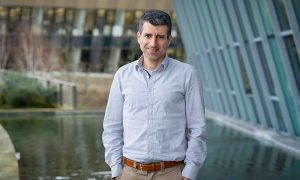
Peer Bork honoured with Novozymes Prize and ISCB Senior Scientist Award
Distinctions recognise Peer’s development and sharing of bioinformatics tools as well as his significant contributions to bioinformatics research, education, and services

For the past 30 years, bioinformatician Peer Bork, Director of EMBL Heidelberg (Scientific Activities), has developed computational tools to interpret complex biological datasets. The tools are heavily used and they help scientists around the world to solve various problems in life sciences and beyond.
Peer Bork’s research group at EMBL Heidelberg focuses on gaining insights into the functioning and evolution of complex biological systems, such as microbial communities. The group uses advanced approaches that integrate different types of complex molecular data, e.g. to study the links and interactions between chemical compounds and microbes. The research helps us to better understand human and planetary health.
This year, Peer’s work has been honoured with two international awards.
2021 ISCB Accomplishments by a Senior Scientist Award
The International Society for Computational Biology (ISCB) recognised Peer’s contributions to the field of computational biology with the 2021 Accomplishments by a Senior Scientist Award. He received the award at the virtual 2021 ISMB / ICCB conference in July.
The ISCB is a scholarly society that aims to advance our understanding of living systems through computation, and to communicate scientific advances worldwide. The Accomplishments by a Senior Scientist Award recognises leaders in the fields of computational biology for significant research, education, and service contributions.
In his scientific work, Peer has explored many different subfields and methods. “It’s a great honour to be recognised with the 2021 Accomplishment by a Senior Scientist Award, because it is conferred by my bioinformatics peers in recognition of my varied contributions to the field,” says Peer.
Novozymes Prize 2021 for developing and sharing bioinformatics tools
Earlier in the year, the Novo Nordisk Foundation had announced that Peer will be awarded the 2021 Novozymes Prize during a ceremony in Copenhagen in September, in recognition of his outstanding and innovative contributions to biotechnology.
“Peer Bork receives the 2021 Novozymes Prize for developing groundbreaking, publicly available and integrative bioinformatic tools. He has developed truly original tools, databases and web servers to collect and analyse the vast quantity of biological data now available. His methods have since been used by hundreds of thousands of academic and industrial researchers for countless applications,” says Bernard Henrissat, Chair of the Committee on the Novozymes Prize, Research Director Emeritus at Aix-Marseille University, France, and Professor at the Technical University of Denmark.
The prize recognises outstanding research or technology contributions that help guide biotechnological science toward innovative solutions. Awarded by the Novo Nordisk Foundation, the prize includes 4.5 million Danish kroner (€605,000) to fund the awardee’s research.
“I feel very honoured to receive the Novozymes Prize,” Peer says. “It’s gratifying to see how extensively our tools are used, and I am very flattered that both researchers and key figures in biotechnology companies nominated me.”
Laying the foundation for worldwide tools
The use of molecular data in the life sciences brings huge opportunities for deeper understanding of life, but data need to be digested and organised in order to be used by researchers around the world. STRING, STITCH, SMART, eggNOG, and iTOL are some of the acronyms used to describe the popular tools that Peer and his colleagues have developed to make it easier for researchers to analyse this ever-increasing volume of data.
Peer’s approach to research has consistently been characterised by collaboration, whether in large consortia or smaller projects. One example is the then conceptually novel way of assigning functions to genes by looking at the conservation of gene neighbours across species, enabling scientists to infer protein interactions. A powerful protein interaction network resource emerged – named STRING.
“With the STRING resource, Peer Bork has done what he has done many times before. By creating an online database to collect known and inferred protein–protein interactions, researchers can now predict new ones in their own data. Peer Bork thus laid the foundation for biological databases and web resources – used across the globe from basic science to bioindustry – for predicting these interactions in an easy way and highly accurately. This has enabled the production of novel medicines but also cleaner, more efficient, and sustainable materials,” says Bernard Henrissat.
Microbiomes of the gut and ocean
Peer continues to seek emerging research fields where fundamental insights into biology can be gained by developing new computational tools. In the mid-2000s, an important emerging field that required such tools was metagenomics, which involves sequencing genome snippets from multiple organisms in a single sample. With metagenomics, researchers can attempt to characterise communities of microorganisms, such as those residing in the human gut.
“We have developed tools based on the microorganisms’ DNA that can provide a snapshot of exactly which bacteria we have in our gut system, enabling us to predict early stages of diseases such as colon or pancreatic cancer better than existing methods, using a completely novel – microbial – approach,” explains Peer.
More recently, as part of the Tara Oceans Consortium, Peer has adapted these concepts to study the oceans, with the aim of understanding microbial biodiversity in the context of environmental conditions.


